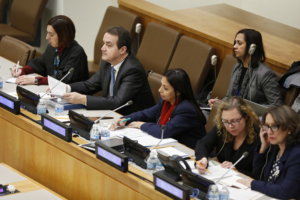Eliminating Gender Inequality in Egypt

Egypt is a country famous for its robust capital city and majestic monuments, reminiscent of the sophisticated ancient civilizations that it once cultivated. However, the country has struggled to alleviate gender disparities, and gender inequality in Egypt has placed its ranking 134th out of 153 countries according to the Global Gender Gap Index. Despite these numbers, Egypt has shown determination to eliminate gender discrimination domestically and worldwide by aiming to provide more representation globally.
Egypt’s Advancements
Egypt recently made substantial steps forward in representing women not only domestically, but worldwide. Dr. Maya Morsy, the President of Egypt’s National Council for Women, was elected to the Committee on the Elimination of Discrimination against Women for 2023-2026. The Committee’s goal is to eliminate all forms of gender discrimination against women and uplift them by recognizing women’s rights through new laws and providing more opportunities. The Committee contains 23 members who are qualified experts in women’s issues.
Dr. Morsy’s significant accomplishment follows the Committee’s previous ruling in 2021 that Egypt would no longer be considered in a state of emergency and that the progress of eliminating gender inequality since 2010 showed great improvement in equality within Egyptian civil society.
Dr. Morsy presented the combined eighth to tenth periodic reports of Egypt to the Committee in 2021 and claimed the creation of a new era for eliminating gender discrimination began with the June 2014 election of President Abdel Fattah El-Sisi. With this election, women became a major focus of Egypt’s National Human Rights Strategy.
In the conclusion report that lifted Egypt from its state of emergency, the Committee praised new key national strategies for its contribution to alleviating gender inequality in Egypt, including acclaim for its 2014 Constitution. It created more opportunities for women in civil, social, political and economic sectors.
Gender Inequality in Egypt’s Workforce
The labor force of Egypt is predominantly male. In 2020, only 18% of women able to work participated in the labor force while 65% of working-age men participated, according to USAID.
According to the World Bank, Egypt-specific studies have predicted that the GDP would rise by 34% if the labor force participation of women was as high as men. GDP is a rough estimate of a country’s standard of living. Because of this, an increase of women in the workforce has a high potential to boost the Egyptian economy and reduce poverty.
The Egyptian Central Agency for Public Mobilization and Statistics reported that the poverty rates between 2015 and 2018 rose dramatically from 27.8% to 32.5%. This hike in poverty led to the less general consumption of goods and services such as education and health care. Increasing the labor force participation rate of women could ultimately positively affect the economy of Egypt while also destigmatizing their presence in the workplace and civil society.
Stepping Forward
Egypt has made tremendous advances toward eliminating gender inequality within its country. The appointment of Dr. Maya Morsy to the Committee on the Elimination of Discrimination Against Women demonstrates Egypt’s dedication to the pivotal issue. Domestically, the creation of more freedoms, such as financial equality, broader property rights and universal access to reproductive health care is reflected in initiatives such as the National Strategy for the Empowerment of Egyptian Women for 2016-2030. In addition, the government saw an increase in the proportion of women in senior management positions to 24.1%.
In Egypt, the future of opportunity expansion for women, according to the current progress in eliminating gender discrimination, appears hopeful and experts such as Dr. Maya Morsy intend to enact change globally.
– Caroline Zientek
Photo: Flickr
